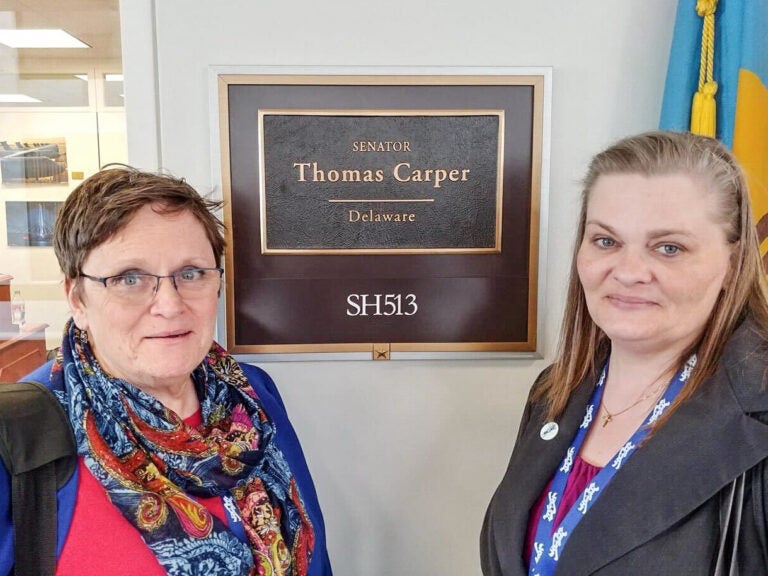Delaware advocate for clean water remembered as PFAS regulations are implemented
Vikki Prettyman, who died of kidney failure last year, helped the Sussex County town of Blades overcome its “forever chemicals” water crisis.

Jean Holloway (left) with friend Vikki Prettyman (right) who died in 2023 after waiting 6 months for a kidney transplant. She suspected her stage 4 kidney failure was due to her exposure to toxic PFAS. (courtesy of Jean Holloway)
From Philly and the Pa. suburbs to South Jersey and Delaware, what would you like WHYY News to cover? Let us know!
Helping people get access to clean drinking water was personal to Vikki Prettyman.
She was exposed to PFAS when she was the administrator for the town of Blades, Del., where residents were told in 2018 their drinking water was contaminated with the toxic “forever chemicals.”
As Prettyman helped the small Sussex County town overcome its water crisis, she began to understand how crucial it is to have safe drinking water.
She was dedicated to giving a voice to small towns — which often don’t receive the resources they need to improve drinking water quality, and where contaminated drinking water is sometimes ignored.
As an employee of the Southeast Rural Community Assistance Project, she helped residents in rural areas eliminate contaminants from their drinking water.
“Small towns are the core of everything,” said friend and former colleague Jean Holloway. “And they usually have the fewest resources… and she was passionate about helping the small towns with things that they might not have the capacity to do on their own.”
Prettyman was diagnosed with kidney failure in 2021, and though she couldn’t prove it, she suspected drinking the PFAS-contaminated water in Blades caused her health problems.

“She was on dialysis and could make dialysis appointments whenever she could,” said her son, Jake Prettyman. “But it kind of attacked and attacked pretty hard.”
Vikki Prettyman died in 2023 — six months after waiting for a kidney transplant.
Last month, the U.S. Environmental Protection Agency implemented the first federal regulations for PFAS in public drinking water. The agency said it will prevent thousands of illnesses linked to the chemicals, including some cancers, thyroid disease, ulcerative colitis, developmental delays among children and poor kidney function.
Drinking-water providers will be required to monitor and treat water to reduce PFAS levels to almost zero over five years, and inform their customers if the chemicals exceed the EPA’s limits.
Families and residents impacted by PFAS have applauded the measure as a positive step in the right direction, hopeful it will prevent other families from hearing gut-wrenching news at the doctors’ office.
“It’s a step to ensure the generations down the road are healthier and better off than we are,” Jake Prettyman said.
Improving health outcomes
PFAS are found in everyday products, such as nonstick cookware and waterproof clothing, as well as in firefighting foam.
The consequences of exposure are long-lasting — the compounds can stay in the environment, and the human bloodstream, for years. Residents located near military bases and airports, where firefighting foam was used during drills, have reported exceedingly high levels of PFAS in their bloodstreams, according to studies.
However, PFAS contamination isn’t isolated to these areas. Almost half of drinking water in the U.S. contains the toxic class of chemicals, according to the U.S. Geological Survey.
Eliminating PFAS will reduce health problems, but the extent is unclear, said Dr. Marilyn Howarth of the Center of Excellence in Environmental Toxicology at the University of Pennsylvania’s Perelman School of Medicine.
People shouldn’t panic if their drinking water tests positive for PFAS, Howarth said, because the cancer risk among the entire population is not significantly high, even for those exposed to high levels of PFAS.
However, it is important to take it seriously, she said.
“If you, unknowingly, have been drinking water with very high levels of PFAS over many years, the research shows that there may be a slightly increased risk of some health conditions, and your doctor should regularly monitor you for those conditions,” Howarth said.
Historically, it has been challenging for residents to get PFAS-related medical screenings if they weren’t part of a study. However, Howarth said she believes medical providers will be more motivated to perform screening tests because of the new federal regulations.
Multiple Centers for Disease Control and Prevention studies are underway, including in the Philadelphia region, to evaluate health risks among people exposed to high levels of PFAS.
Howarth said as additional research becomes available, the EPA is likely to make its regulations more strict and police more types of “forever chemicals.”
Until the new regulations are fully implemented, she recommends purchasing a pitcher filter certified to reduce PFAS. Howarth also encourages residents with private wells, which are not regulated, to test their water — particularly if they live in an area that may have been contaminated with firefighting foam.
A passion to serve
Former colleague and friend Jean Holloway believes Vikki Prettyman would have applauded the new regulations but would want to ensure small towns are provided enough resources to address contamination.
The town of Blades, where metals were also found in groundwater, was placed on the EPA’s National Priorities List in 2020 to receive remedial action under the Superfund program. Public and private well water is treated with filtration systems, and in February, the EPA committed to connecting residents with private wells to an alternative water supply.
However, most municipalities don’t have the support that comes with being on the National Priorities List.
Filtration systems that remove PFAS cost millions of dollars. To offset some of these expenses, Pres. Joe Biden’s administration has set aside billions of dollars to address the chemicals. However, water providers say additional financial support is needed to meet the new regulations.
During an interview with WHYY in 2022, Prettyman stressed the importance of PFAS restrictions — arguing that regulators were lagging behind. However, she said she believed polluters should be held responsible for the financial burden of eliminating the chemicals.
“I think she would say, ‘It’s about time,’ but she would also say … they need to go farther in terms of assistance to the small communities who can’t necessarily afford it,” said Holloway, who helped hire Prettyman at the Southeast Rural Community Assistance Project.
She remembers her friend for her dedication and devotion.
“She was well on her way to a stellar career with SERCAP, and it’s just unfortunate that it got cut short the way it did,” Holloway said. “She would have been one of the stars of the organization.”
Jake Prettyman said he wants his mother to be remembered for her passion to serve, from advocating in Washington for clean water funding and legislation to helping people who are homeless get shelter, food and clothing.
“She always wanted to make sure everything was done for the betterment of people’s lives,” he said. “And I think a lot of people would tell you that she was just a light in the world.”

Get daily updates from WHYY News!
WHYY is your source for fact-based, in-depth journalism and information. As a nonprofit organization, we rely on financial support from readers like you. Please give today.






